

Your brain on movies: Why films make us cry, flinch and cheer. If you’ve ever wept, giggled or grieved inside a movie theater, you know: Some of our most intense emotional experiences come when we’re watching a film.

“Given that all you’re perceiving are the vibrations of some speakers and a succession of still digital images on a screen – why do we take that as real?” Asked Jeffrey Zacks, a professor of psychology and director of the Dynamic Cognition Laboratory at Washington University in St. Louis. He revealed some of the answers to TODAY and in his new book, “Flicker: Your Brain on Movies,” which examines how —if our brains evolved to deal with the live, three-dimensional real world — we have such powerful reactions to films.
Emotion and the Film Scores. An Empirical Approach by Hilary Schaefer This paper discusses some common assumptions made about the emotional effects of film scores and outlines several empirical studies that could be performed in order to test these assumptions.
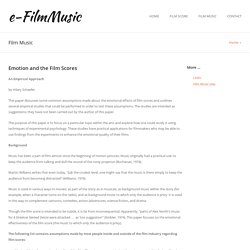
The studies are intended as suggestions; they have not been carried out by the author of this paper. The purpose of this paper is to focus on a particular topic within the arts and explore how one could study it using techniques of experimental psychology. These studies have practical applications for filmmakers who may be able to use findings from the experiments to enhance the emotional quality of their films. Background Music has been a part of film almost since the beginning of motion pictures. BBC Arts & Culture - How do film-makers manipulate our emotions with music? 13 September 2013Last updated at 18:54 By Helen Stewart BBC Arts & Culture The jabbing notes in Psycho's shower scene trigger the same response as the sound of screaming animals In 1939, queen of Hollywood melodrama Bette Davis starred in Dark Victory - the tragic story of a wealthy party girl dying of a brain tumour.

The audience knows that death will follow quickly after blindness. In the finale, her character's vision begins to falter and she moves slowly up a grand staircase. Davis knew this moment would secure her chance of a third Academy Award. She asked the director, "Who's scoring this film? " Steiner had composed the revolutionary score to King Kong in 1933. Davis was a clever woman. Culture - Why does music evoke memories? Rhythm Is a Dancer’ is the song that does it for me.

It’s a tune by the German Eurodance group Snap! , that was played a lot one summer as I travelled across Europe. I hear just one refrain from it – “It's a soul companion/ You can feel it everywhere” – and the late nights and sandy beaches come immediately to mind. But were I deliberately to try and remember something particular from that holiday, without the music, I would recall nothing as immediate or emotional. Music Is What Feelings Sound Like. Music and Emotion. 8 Surprising Ways Music Affects the Brain. I’m a big fan of music, and use it a lot when working, but I had no idea about how it really affects our brains and bodies.
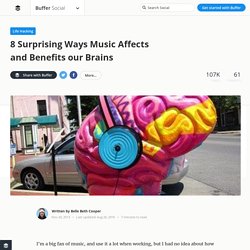
Since music is such a big part of our lives, I thought it would be interesting and useful to have a look at some of the ways we react to it without even realizing. “Without music, life would be a mistake” – Friedrich Nietzsche Of course, music affects many different areas of the brain, as you can see in the image below, so we’re only scratching the surface with this post, but let’s jump in. Share stories like this to your social media followers when they’re most likely to click, favorite, and reply! Schedule your first post with Buffer. 1. We can usually pick if a piece of music is particularly happy or sad, but this isn’t just a subjective idea that comes from how it makes us feel. Even short pieces of happy or sad music can affect us. 2.
Music and Emotion — THE SYNC PROJECT. Investigation of the vast array of processes that are suggested to underlie music-evoked emotions will surely continue to keep scientists busy in the future.
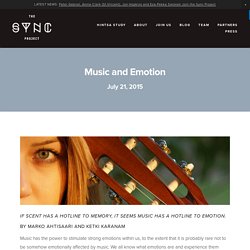
Uncovering the ways in which music evokes emotion will provide revelations into why music has such power in influencing listeners, and shed light on the interplay between physiological, cognitive, social and cultural factors in music-evoked emotions. Understanding the connections between these functions would help us use music in an informed way, for example to help cognitive functioning and emotional wellbeing. Importantly, the science will give insight into how the emotional effects of music could be more systematically harnessed to develop clinical applications. By Marko Ahtisaari and Ketki Karanam References 1. 2. 3. 4. 5. 6. 7. 8. 9. Every song has a color – and an emotion – attached to it.
Imagine yourself as a graphic designer for New Age musician Enya, tasked with creating her next album cover.
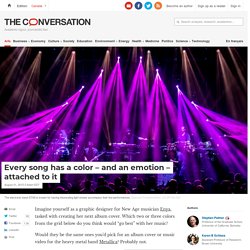
Which two or three colors from the grid below do you think would “go best” with her music? Would they be the same ones you’d pick for an album cover or music video for the heavy metal band Metallica? Probably not. Emotions and music : Copernicus Science Centre. Emotions are importantMusic was created in order to affect our feelings.
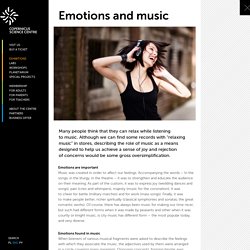
Accompanying the words – In the songs, in the liturgy, in the theatre – it was to strengthen and educate the audience on their meaning. As part of the custom, it was to express joy (wedding dances and songs), pain (cries and whimpers), majesty (music for the coronation); it was to cheer for battle (military marches) and for work (mass songs). Finally, it was to make people better, richer spiritually (classical symphonies and sonatas, the great romantic works). Are your Emotions Linked with the Music You Listen To?
For every feeling you have, there is a certain song that just speaks to you and makes you feel better inside, and that’s why we like music so much: for the emotion it provides us.
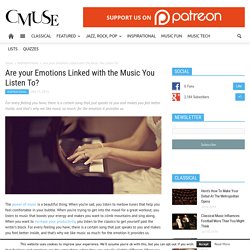
The power of music is a beautiful thing. When you’re sad, you listen to mellow tunes that help you feel comfortable in your bubble.